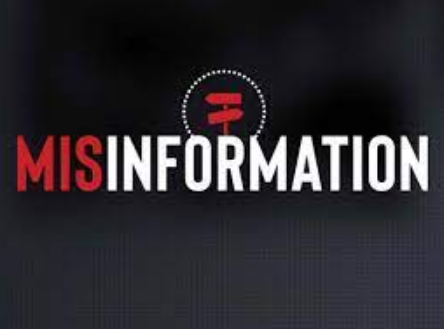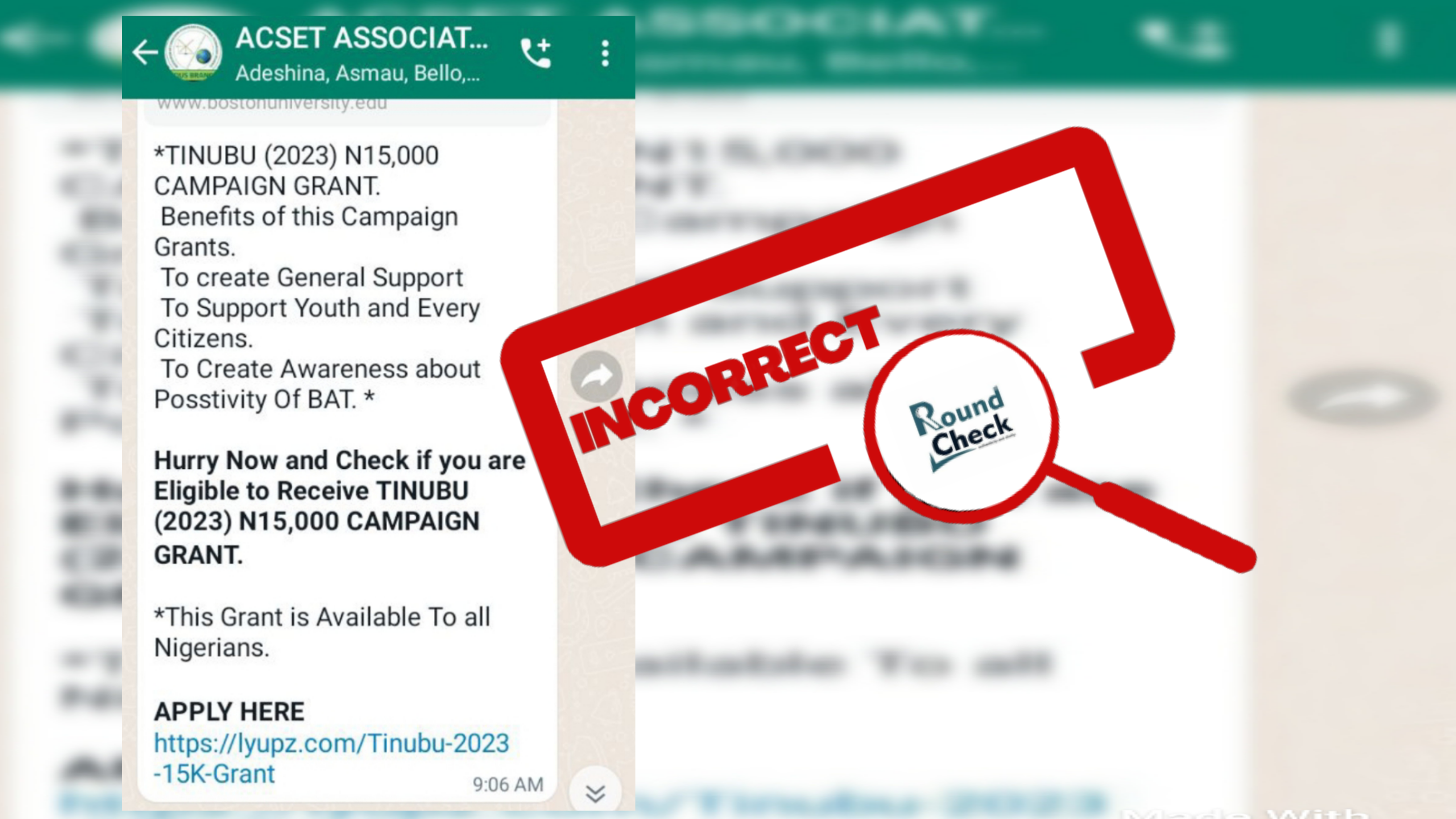|
Getting your Trinity Audio player ready...
|
by Zainab Adewale
The 2023 general election in Nigeria is fast approaching, but as it draws near misinformation is growing into a lethal threat. Misinformation is being spread through social media platforms, which are one of the main sources of information for many Nigerians. This is done by sharing photos and videos that have been doctored to appear real while actually being fake in order to promote biases between religious and personal beliefs, false information, and an attempt to advance an agenda.
Despite not being a new phenomenon, misinformation has a long history. But due to widespread internet use, easy access to social media platforms, cutthroat politics, and battles for supremacy among various ethnic and religious groups, it has intensified to a greater extent recently.
As it stands, information is a critical component of Nigeria’s democracy, and because it is subject to manipulation and can provide false information, it has the capacity to inspire violence in society and seriously damage Nigeria’s unity.
Misinformation in Nigeria.
Nigeria practices democracy, and as a result, it provides an atmosphere for its citizens to hold, form, and express opinions in order to encourage participation in good governance. Among the benefits of Nigeria’s transition to a civilian administration in 1999 were notable advancements in civil liberties as well as freedom of expression, which is a crucial human right protected in Article 19 of the 1948 Universal Declaration of Human Rights.
Although there has been a drastic change in terms of persistent corruption and violence, it is assumed that Nigerians are at least able to express themselves freely in the context of Nigeria’s new political environment.
Nigeria has been rated partly free in terms of freedom of expression online due to the development of mobile devices, the internet, and social media, all of which have had a significant impact on the information-sharing system. For the purpose of forming and disseminating knowledge or opinions, citizens create platforms like websites and blogs. Others create social media profiles to express their opinions. All of these have profound variances in opinions, sentiments, and religion.
The terms misinformation, disinformation, and malinformation are grouped together under the overarching concept of “information disorder.” While disinformation is deliberately fabricated information that is disseminated for negative reasons, misinformation is inaccurate information that may be shared by those who think it is true. Malinformation, on the other hand, focuses on utilizing frequently overstated facts to deceive and maybe hurt, while being less prevalent but no less powerful.
The proliferation of misinformation, also known as “fake news,” in modern democratic politics has recently generated a great deal of controversy. It is impossible to contain or correct, and it spreads like wildfire. However, its capacity to distort the truth makes it a threat in a democratic setup.
As more sources and platforms come online, the spread of misinformation is growing every day. Many are the product of politicians, the media, or interest groups, which have fueled hate speech, sentiments, mistrust, and the abuse of free expression, threatening the country’s unity. To that end, there is a growing demand for accountability, which has exposed users to the risk of misinformation.
In 2019, in preparation for the general election, there was a false report, which was later fact-checked by Dubawa, that Peter Obi, then vice-presidential candidate of the opposition party, the People’s Democratic Party (PDP), asked northerners to carry ID cards while he was Anambra state governor. Also in 2018, there were rumors about doctored images shared across social media alongside claims that Muhammadu Buhari, the candidate of the All Progressive Congress (APC), had died and was replaced by a body double infamously known as Jibril of Sudan.
Misinformation and disinformation have the ability to further polarize the nation and skew the results of the election, which may have an impact on the validity of the elections and the leaders that emerge from the process. Additionally, spreading misleading information to delegitimize political opponents or sway voters through the electoral process is one of the frequent ways that misinformation is used in elections. These are in addition to the delegitimization of electoral institutions like INEC, the Nigeria Police Force, and other state agencies, as well as content fabrication or manipulation, polling data, and other state electoral institutions.
Its Impacts Towards The 2023 General Election
As the 2023 general elections draw nearer, misinformation that may influence public perception of politicians and parties and sway voters becomes more widely disseminated. On that note, some sophisticated individuals may attempt to utilize misleading information, unverified news, and misinformation as instruments to create chaos and disorder in the country.
In recent years, the political climate in the nation has drastically transformed, introducing innovative changes and unusual threats to the democratic system of the nation. The country’s contemporary political culture is, for the most part, inextricably linked to the advancement of information and communication technology, which, tragically, have come to be widely perceived as weapons.
The invention of powerful technologies has led to the use of social networks in dramatically increasing the rate of falsehoods, especially those spread by governments, politicians, deceptive corporate individuals, and people who share uncritical public stories; these and other types of misinformation are committed with the intention of seeking or gaining platforms to pursue financial gains in the advertising section.
Misinformation is the most commonly employed label for research focused on the buildup and impacts of false information. Part of this has to do with the fact that it has become an encompassing term related to concepts like disinformation, ignorance, rumor, conspiracy theories, and the like. Researchers discovered that misinformation is tightly linked on both Facebook and Twitter, with false information garnering more likes, shares, and replies than real news or false information lacking a moral-emotional hook.
Professional liars have benefited from these platforms because they can use them to propagate misinformation, peddle fake information, or gain personal recognition. With all of these, there is growing concern that Nigerians are gaining access to inaccurate and deceptive content without verification or verifiable attribution, and the rise of “yellow journalism,” with fabricated or manipulated stories, fraudulent content, character assassination, and fake news, is largely dependent on technology.
There are numerous additional factors that contribute to the rapid spread of fake news, such as widespread distrust of elites, leaders, and politicians by the majority of Nigerians; the availability of cheap data services facilitating the explosive use of social media platforms to spread rumors, propaganda, and fake information; sensationalized fake news disseminated for economic reasons; authoritative lies that are very common from government sources at all levels; and the low capacity of the media to immediately gather, process, and verify distant information in real-time, amongst others.
Today, fake news is viewed as a threat to national stability, order, and peace. The dissemination of misleading information on websites and other channels has grown to alarming proportions. Citizens must reject fake news, refrain from acts of hostility, and say no to disintegration in order to prevent false information and the delegitimization of their country.
Mr. David Ajikobi, the Nigeria editor of Africa Check, said misinformation can affect people’s perceptions of the electoral process, the voting process, and the candidates, but most importantly, it can sway the minds of the people. According to him, one of the real dangers of misinformation around elections is that it doesn’t allow people to focus on the real issues, such as infrastructure and development, and it can also lead to post-election violence.
“In the 2015 election, misinformation was not a big deal, but of course, it was happening. Fast forward to the 2019 election, it became a concern and now in 2023, it has become an existential threat that even the INEC had said misinformation will affect the conduct, outcome, and integrity of the election. For example, if one Mr. Ade somewhere come up with a fake election result, published it, posted it on WhatsApp and it went viral. If the party he belongs to won and the other party that has the majority votes lost, there is a possibility that the members of the other party will come out to demonstrate riot or violence”.
Another expert, Mr. Lekan Otufodurin, of the ED Media Career Development Network, said ignorance is one of the reasons people spread misinformation, and it can be very harmful to the general election coming up. “Misinformation trends faster than the truth and can cause damages and threat. It can lead the people not to vote wisely, get wrong information about the candidates and definitely cause harm to society.
“The only solution that can curb misinformation is the use of media literacy. It should be propagated amongst the citizens so they are not vulnerable to the general election. This is to enlighten the people about the dangers surrounding the spreading of misinformation”.
Zainab Adewale is young fact-checking journalist and budding writer. She can be reached via zainabadewale07@gmail.com. She tweets at @zainab__adewale
NB: This report was earlier produced on the 6th of February, 2023.








